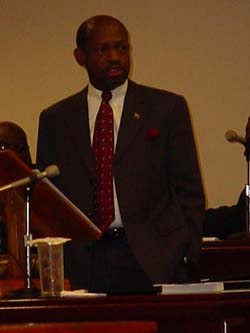 |
| St. Kitts and Nevis Prime Minister and Minister of Finance Dr. the Hon. Denzil L. Douglas presenting the 2006 Budget Address in the National Assembly on Tuesday. |
BASSETERRE, ST. KITTS, DECEMBER 13TH 2005 - All telephone calls including domestic ones, will attract a five percent tax from January 1st next year.
This was one of the fiscal measures announced Tuesday by St. Kitts and Nevis' Prime Minister and Minister of Finance, the Hon. Denzil L. Douglas when he presented a EC$494.7 million Budget for 2006 in the National Assembly on Tuesday.
In his three and a half hour presentation, Prime Minister Douglas also announced an 15 percent excise duty on alcohol and tobacco products and an additional two percent increase in the Social Services Levy that applies only to that portion of salaries in excess of EC$8,000 monthly.
He pointed out that with the liberalisation and increased competition in the telecommunications sector which is exerting downward pressure on the price of the telephone service, it is unlikely that the overall telephone bill of consumers would increase substantially in 2006 even after the revised tax is levied.
Dr. Douglas said the liberalisation of the telecommunications sector has also opened up opportunities for not only other companies to engage in this business but the competition has served to reduce prices considerably.
"We feel that the time is now right to extend the current tax on international calls to land based calls," said Dr. Douglas, who pointed out that the liberalisation of the telecommunications sector was a very costly and time consuming exercise and the Federal Government was still servicing a loan from the World Bank that was used to finance the liberalisation process.
"The increased tax will therefore assist in the servicing of this loan," he told the Federation.
Dr. Douglas noted that the current Income Tax Legislation requires companies to file their tax returns by the 15th of April each year but allows them three months after their assessment to make payment to the Inland Revenue Department.
"This does not allow the Government to manage its cash flow in an effective manner. Therefore in order to address this issue the Income Tax legislation will be amended to allow for self-assessment and for payment to be made on the date of filing," said Prime Minister Douglas, who emphasised that this does not represent an increase in taxation. "It merely requires earlier payment of the Income Tax paid by corporations," he said.
According to Dr. Douglas, as St. Kitts and Nevis begins to tackle the fiscal impact of the closure of the sugar industry, matters such as the servicing of the debt, providing for the health, training and social protection of former sugar workers, the maintenance of the environment and land management issues, have cost implications.
In trying to come up with innovative ways of raising revenue to assist with the sugar transition, the Federal Government has been consulting with its economic and social partners on the tax system that they feel would be best suited to the structure of the new economy and have also been studying the proposals of the Tax Reform and Administration Commission.
Dr. Douglas said that one of the overlapping areas of concern is with respect to the lack of "progressivity" of the Federation's tax system in the absence of personal income tax.
"To address the foregoing, from 1st January 2006, we have decided to increase the Social Services Levy from 8% to 10% for salaries in excess of $8000 per month. This increase would only apply to the portion of salary in excess of $8000," said Dr. Douglas.
He told the Federation that the transition of sugar will result in substantial increases in the cost of social services, including health care and social safety net payments and this increase will help in defraying a portion of the additional cost.
Imposing a 15 percent tax on alcohol and tobacco products, Prime Minister Douglas noted that in most countries, alcoholic and tobacco products, which are injurious to one's health and which place a burden on the health system, are normally more heavily taxed than other consumer goods.
"In St. Kitts and Nevis, the reverse is often true in that these goods are sometimes taxed less severely than other goods. To correct this anomaly, an excise duty will be introduced on alcoholic and tobacco products to be levied on the c.i.f. values of these goods plus any applicable import duties," said Prime Minister and Minister of Finance Douglas, who explained that the excise duty will be applied at the rate of 15 percent initially.
"This tax is consistent with our efforts at promoting healthy life styles among our people. Moreover, our health system incurs tremendous cost in respect of diseases associated with the consumption of alcohol and tobaccos. It is only fair that the users of these products be asked to bear a portion of this cost," said Dr. Douglas, who outlined his Governments plans to further the growth and development of the economy particularly in light of the need for transformation after the closure of the sugar industry and in addressing the debt situation.
The Prime Minister said that as St. Kitts and Nevis faces the challenges which inevitably accompany change, both the public and private sectors have areas of responsibility that must be fulfilled.
Government is responsible among other things for creating a stable and predictable macroeconomic environment, but the Government on its own does not have all of the finances, knowledge and social capital necessary to propel the economy along the desired path.
"The citizens of St Kitts and Nevis must therefore be prepared to contribute to the successful transformation of our country. I am sure that we would all agree that some sacrifices are necessary in order to take us successfully through this period of our development," said Prime Minister Douglas.